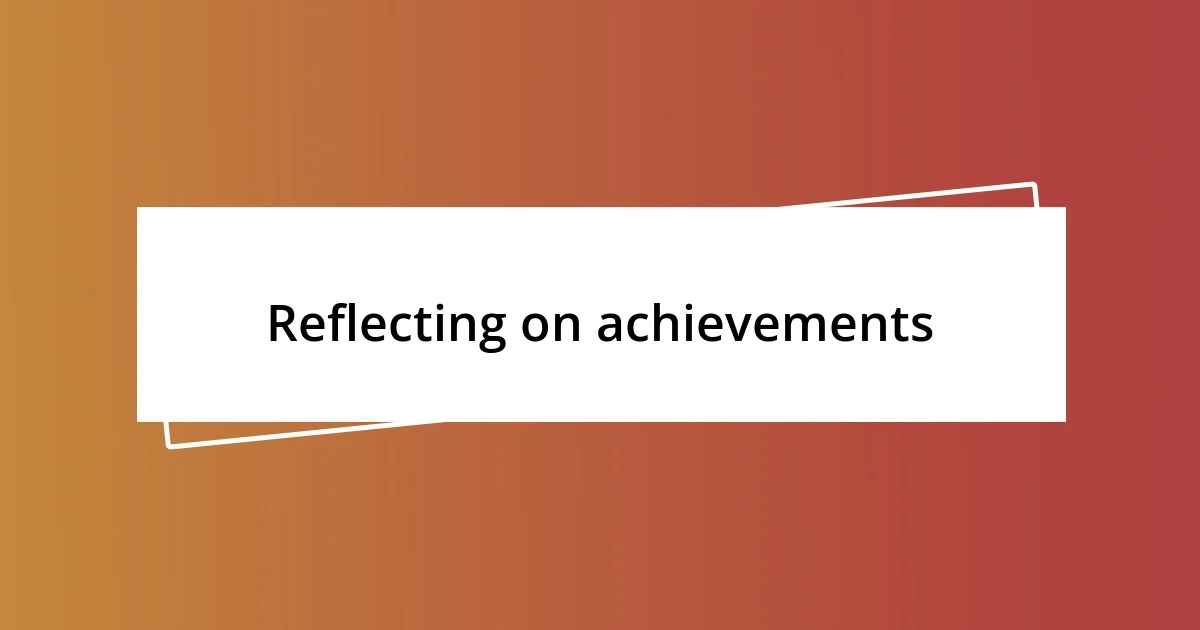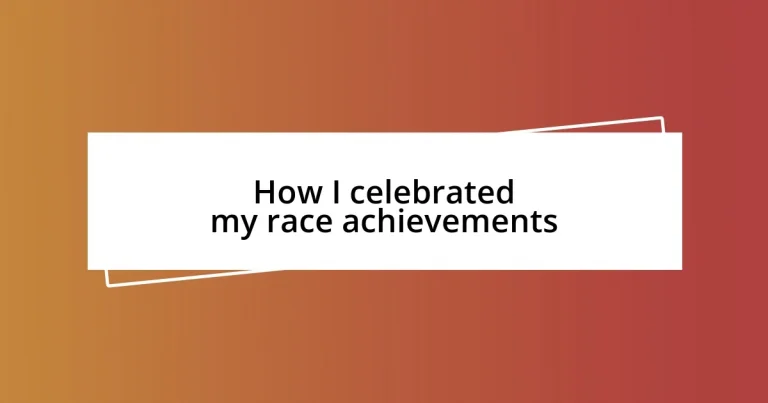Key takeaways:
- Emphasizing mental resilience and the importance of overcoming mental barriers in racing, as crucial as physical training.
- Setting and adapting both short-term and long-term goals can significantly enhance motivation and lead to personal achievements.
- Celebrating race achievements with loved ones and documenting the journey fosters connections and allows for reflective growth as an athlete.

My journey in racing
Reflecting on my racing journey always brings a wave of nostalgia. I remember my first race vividly; my heart raced just as fast as my legs did. The thrill of standing at the starting line, surrounded by seasoned competitors, made me wonder if I truly belonged there. Did I have what it takes?
As I gained experience, each race taught me something new. After one particularly grueling marathon, when I crossed the finish line, I felt an overwhelming rush of emotions. It was more than just exhaustion; it was a profound sense of accomplishment. I realized that overcoming my mental barriers was just as crucial as physical training. Can you believe how much our minds can hold us back?
Through each victory and setback, my passion for racing only deepened. I recall a time when I faced a major setback with an injury. I had to learn to embrace patience and trust the process. That moment not only shaped my resilience but also helped me connect with other racers facing similar challenges. Isn’t it incredible how racing becomes a metaphor for life itself?

Setting personal achievements
Setting personal achievements is a crucial part of any racing journey. I remember setting a goal to improve my 5K time. Each week, I tracked my progress, and with every small improvement, my motivation grew. It became clear to me that celebrating these milestones, no matter how tiny, fueled my desire to push myself further.
As I continued racing, I learned to set both short-term and long-term goals. One year, I aimed to qualify for a coveted race. The thrill of knowing I was training for something bigger kept me focused. I vividly recall the day I achieved that goal; the sense of euphoria just washed over me. It was a reminder that perseverance and strategic goal-setting can unlock new heights.
Finally, it’s essential to adapt your goals as you evolve as a racer. After conquering a few races, I found that my interests shifted towards trail running. I decided to set achievements not only around speed but also about embracing new terrains and experiences. This mindset shift enriched my journey, making it more fulfilling and rewarding.
| Type of Achievement | Description |
|---|---|
| Short-term Goals | Focused on immediate improvement, like training for a 5K. |
| Long-term Goals | Encompassing larger aspirations, such as qualifying for a major race. |
| Adaptable Goals | Goals that evolve with your racing journey, leading to new experiences. |

Choosing the right celebrations
Choosing the right celebrations can make all the difference in how you reflect on your racing achievements. I recall a time when I crossed the finish line of my first half-marathon. I was drenched in sweat and barely able to walk. Instead of planning an extravagant celebration, I opted for a cozy dinner with a few friends who had supported me throughout my training. That intimate moment, filled with laughter and shared stories, turned out to be one of my most cherished memories. Celebrating doesn’t always have to be a grand affair; sometimes, it’s the simplicity of connection that resonates the most.
To help you choose celebrations that align with your achievements, consider these factors:
– Personal Significance: Think about what truly matters to you. Is it a celebration with friends, family, or a moment of solitude to reflect?
– Type of Achievement: Different accomplishments call for different celebrations. A fun run may warrant a casual gathering, while a marathon finish could deserve a toast!
– Emotional Connection: Acknowledge your feelings. Maybe you want to write a letter to yourself about this achievement or create a scrapbook highlighting your journey.
– Sustainability: Plan celebrations that you can easily manage. Whether it’s a small reward or a more extensive outing, keep it within reach.
These insights can guide you in crafting a celebration that’s not only memorable but also resonates deeply with your personal journey as a racer.

Inviting friends and family
Inviting friends and family to celebrate your race achievements is a heartwarming step in the journey. I remember how special it felt to have my family cheering me on from the sidelines during my first marathon. Seeing their proud faces as I crossed the finish line motivated me beyond measure. Wouldn’t you agree that sharing these moments with loved ones amplifies the joy?
When it comes to planning these gatherings, I’ve learned that the atmosphere matters immensely. For my last race achievement, I hosted a casual barbecue in my backyard. The smell of grilled food wafting through the air and the sound of laughter filled the space, creating a cozy environment to relive our racing stories. It’s extraordinary how an informal setting with friends can turn into an unforgettable celebration, don’t you think?
Including everyone who supported you can transform the celebration into a beautiful reflection of your journey. I often send personal invitations that highlight what each person’s support meant to me during training. This gesture makes them feel valued and part of the experience. After all, the people we surround ourselves with play a vital role in our successes. How do you express gratitude to those who cheer you on?

Documenting the celebration
One of the best ways I’ve found to document celebrations is through photography. After crossing the finish line of a challenging race, I snapped pictures of my medal, the finish area, and the friends I celebrated with that day. Each image captured the essence of our joy, making it easy to revisit those feelings in years to come. Have you ever looked back at a photo and instantly felt the rush of emotions from that moment? I find it fascinating how a single image can evoke such powerful memories.
Journaling also plays a key role in how I commemorate my achievements. After each race, I set aside time to reflect on my experience and the emotions I felt. I remember one particular race where I had to fight through doubts; putting those thoughts on paper not only helped me process my journey but also served as a reminder of my resilience. What stories do you have from your races that deserve to be documented? I believe every runner’s journey deserves to be celebrated in words, creating a narrative that reveals who we are as athletes.
Creating a scrapbook has become my favorite way to document these moments as well. After completing a series of races, I collected bibs, medals, and notes from friends who cheered for me, binding them all into a colorful book. It became a cherished keepsake that I flip through during tough training days, reigniting my passion and reminding me of how far I’ve come. Have you ever thought about crafting something tangible to celebrate your achievements? It’s incredible how these small projects can not only document your accomplishments but also continuously inspire you throughout your journey.

Reflecting on achievements
Reflecting on my race achievements often brings a rush of emotions that remind me of what I’ve overcome. I vividly recall the moment after my first race, sitting on the curb, medal around my neck, and feeling a blend of exhaustion and pure exhilaration. In that stillness, I realized that every early morning training session had led to this triumph—it made me appreciate the journey even more. Have you ever sat quietly with your thoughts and felt the weight of your accomplishments sink in?
I find that the practice of reflection allows me to connect emotionally with my journey. One time, after completing a half-marathon, I took a long walk to process the day. Each step reminded me of the training runs filled with sweat and doubt. I had to dig deep on race day, pushing through fatigue and mental hurdles. That walk helped me not only savor the victory but also appreciate the grit required to achieve it. Isn’t it amazing how those tough moments contribute to our biggest milestones?
Moreover, I try to relive the stories behind my moments of success. After a particularly grueling race, I reached out to my fellow runners to discuss our experiences. Hearing their stories, filled with laughter and struggles, I felt a sense of camaraderie that deepened my own achievement. I realized that every finish line crossed is a collective victory, celebrated not just in solitude, but together. How do you reconnect with the stories that shape your racing journey?

Planning for future races
Planning for future races is a thrilling endeavor that adds an extra layer of excitement to my running journey. I always start by analyzing my past performances; for instance, after finishing a particularly challenging 10K, I noted areas for improvement, like pacing and hydration strategies. Have you ever looked back at your race times and thought about what you could do differently next time? It’s captivating how those reflections can shape your training plan moving forward.
I also set specific goals to keep myself motivated. Last year, I decided to tackle a half-marathon, aiming not just to finish but to beat my previous time. I broke down my training into a structured schedule, with weekly milestones that made the big goal feel much more manageable. How do you keep track of your progress? For me, using running apps has become invaluable. They help me not only monitor my runs but also provide a platform to set challenges, which keeps my competitive spirit alive.
Finally, I prioritize the importance of rest and recovery in my race planning. I remember how I felt after neglecting proper recovery in my earlier races—exhausted and frustrated when I didn’t race as well as I hoped. Now, I schedule rest days and incorporate cross-training to prevent burnout. Do you consider rest as part of your training regime? Emphasizing recovery has transformed my approach, making me feel fresher and more prepared when the next race day arrives.














